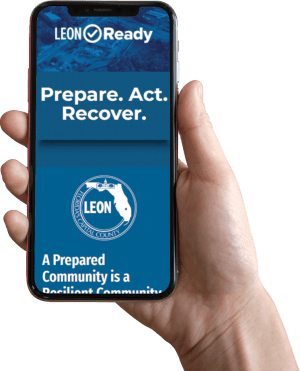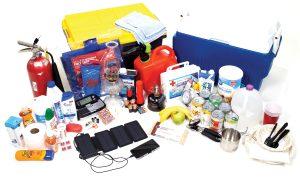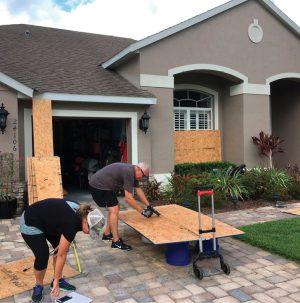 Weather researchers at Colorado State University (CSU) released an early outlook for the 2023 hurricane season, predicting slightly below-average activity in hurricanes developing near the U.S. Atlantic coastline, on the Gulf Coast, and in the Caribbean. However, as many Florida residents know, especially those in Leon County, it only takes one land-falling hurricane to make it an active season for us all. In fact, Hurricane Ian, which made landfall last year, was Florida’s most expensive storm and the third-costliest storm in U.S. history, with more than $112 billion in damage.
Weather researchers at Colorado State University (CSU) released an early outlook for the 2023 hurricane season, predicting slightly below-average activity in hurricanes developing near the U.S. Atlantic coastline, on the Gulf Coast, and in the Caribbean. However, as many Florida residents know, especially those in Leon County, it only takes one land-falling hurricane to make it an active season for us all. In fact, Hurricane Ian, which made landfall last year, was Florida’s most expensive storm and the third-costliest storm in U.S. history, with more than $112 billion in damage.
The Atlantic hurricane season, which lasts from June 1 through November 30 (reaching a peak in August, September, and October), is expected to produce 13 named storms in 2023. Six of those could become hurricanes, and two could grow into major hurricanes. Florida is an active state for devastating hurricanes and tropical storms. History has repeatedly demonstrated that inland communities such as ours are just as susceptible to hurricane impacts like flooding, tornadoes, and high winds.
As we know from Hurricanes Hermine (2016), Irma (2017), Michael (2018), and Ian (2022), every emergency exposes different vulnerabilities, tests a community’s partnerships uniquely, and reveals opportunities for improvement in various ways.
Leon County Government remains committed to addressing the urgent needs of the citizens we serve before, during, and after weather-related disasters. We continue to keep our community engaged, listen to our citizens, and address the challenges we face together. You can see this in the hundreds of findings and recommendations in our after-action reports following the three hurricanes that recently impacted our community. Leon County has since implemented these recommendations, which include increasing special needs sheltering capacity for our most vulnerable people who need our help the most and directly engaging with neighboring rural communities to coordinate volunteers and donations.
This commitment to learning and improving led to FEMA and the Federal Alliance for Safe Homes designating Leon County as the first #HurricaneStrong community in the nation. #HurricaneStrong is a national hurricane resilience initiative designed to save lives and homes through collaboration with leading organizations in the disaster safety movement. You too can become #HurricaneStrong by following this five-step process: Personal Safety, Family Preparedness, Financial Security, Strengthen Your Home, and Help Your Neighbors.
 Personal Safety – Know your risks. The Big Bend is vulnerable to a variety of hazards from hurricanes to wildfires. Do your research and determine which risks threaten your home. Review the Leon County Disaster Survival Guide at www.LeonReady.com for preparedness information for all kinds of hazards.
Personal Safety – Know your risks. The Big Bend is vulnerable to a variety of hazards from hurricanes to wildfires. Do your research and determine which risks threaten your home. Review the Leon County Disaster Survival Guide at www.LeonReady.com for preparedness information for all kinds of hazards.
Family Preparedness – Have a plan, have a kit, and stay informed to prepare your family for disasters. Once you have assessed your risks, your emergency plan will be your family’s guide on how to react when an emergency occurs. Your emergency plan will help family members know where to shelter in your home, where to go and what route to use if your family is subject to a mandatory evacuation, and how your family will communicate with one another when a disaster strikes.
 When a disaster is imminent, such as the approach of a hurricane, it will be too late to gather the appropriate supplies. Building a kit well in advance ensures your family will have the essential survival supplies on hand when disaster strikes. A five-gallon bucket with a lid makes an excellent container for your disaster supply kit. It is also important to have at least three days’ worth of supplies on hand, as it may take at least that long for emergency responders to begin clearing roadways and restoring electricity following a disaster.
When a disaster is imminent, such as the approach of a hurricane, it will be too late to gather the appropriate supplies. Building a kit well in advance ensures your family will have the essential survival supplies on hand when disaster strikes. A five-gallon bucket with a lid makes an excellent container for your disaster supply kit. It is also important to have at least three days’ worth of supplies on hand, as it may take at least that long for emergency responders to begin clearing roadways and restoring electricity following a disaster.
No matter if you can see a disaster coming, like a hurricane, or if it happens suddenly, staying informed is important. Follow your local media sources, like radio, television, or online news. Also, the best way to stay up-to-date on the changing nature of the emergency is to tune into Leon County Government’s information sources. In Leon County, you can receive emergency information by downloading our Citizens Connect App, which is available from the Google Play or Apple App Store. For those with internet access, you can get updates from Leon County online at www.LeonCountyFL.gov/ei. Also, during a disaster, Leon County partners with WFSU Radio (88.9 FM) and iHeartMedia to provide real-time emergency information from Leon County’s Emergency Operations Center.
Neighborhood Preparedness – When you are prepared for a disaster, you become a resource for your neighbors. Work with neighbors to help them understand their risks and how best to prepare. Discuss community preparedness during neighborhood meetings. Volunteer with a local organization that provides disaster assistance services. You can receive training on how to best help others in need. For more information on volunteering, please contact Leon County Volunteer Services at 850-606-1970.
 Financial Security – The adage of “saving for a rainy day” is never truer than following a disaster. Wind, rain, fire, or flood — any hazard has the potential to damage your home. Having the ability to repair and restore your home allows you to recover quicker following a disaster. Insurance is an important part of covering the costs of repairing and restoring your home. Each year, check with your insurance carrier to ensure you have the right amount of appropriate coverage. Many citizens are unaware that standard homeowner’s insurance does not cover flooding. Keep a small amount of cash at home in a safe place. It is important to have small bills on hand because ATMs and credit card machines may not work during a disaster.
Financial Security – The adage of “saving for a rainy day” is never truer than following a disaster. Wind, rain, fire, or flood — any hazard has the potential to damage your home. Having the ability to repair and restore your home allows you to recover quicker following a disaster. Insurance is an important part of covering the costs of repairing and restoring your home. Each year, check with your insurance carrier to ensure you have the right amount of appropriate coverage. Many citizens are unaware that standard homeowner’s insurance does not cover flooding. Keep a small amount of cash at home in a safe place. It is important to have small bills on hand because ATMs and credit card machines may not work during a disaster.
 Strengthen Your Home – Prepping your home before a disaster helps limit the impacts of the disaster. While permanent home improvements are best for protecting your home, there are several do-it-yourself projects to help you prepare and stay safe. Remember, please stay safe if you are climbing on your roof; many injuries related to falls occur before hurricanes. Temporary plywood shutters can be created to protect your windows and glass sliding doors from wind impacts during hurricanes. This is a project that needs to be completed well in advance of the hurricane. To make the process easier, measure all the windows in your home that need protection. Once you purchase the plywood, cut and label it beforehand to make installation easier when a storm is closing in. Sandbags can temporarily be positioned around your home to help divert water from vulnerable areas, such as external doors and garage doors. Make sure to place heavy-duty plastic sheeting between doors and sandbags for more protection.
Strengthen Your Home – Prepping your home before a disaster helps limit the impacts of the disaster. While permanent home improvements are best for protecting your home, there are several do-it-yourself projects to help you prepare and stay safe. Remember, please stay safe if you are climbing on your roof; many injuries related to falls occur before hurricanes. Temporary plywood shutters can be created to protect your windows and glass sliding doors from wind impacts during hurricanes. This is a project that needs to be completed well in advance of the hurricane. To make the process easier, measure all the windows in your home that need protection. Once you purchase the plywood, cut and label it beforehand to make installation easier when a storm is closing in. Sandbags can temporarily be positioned around your home to help divert water from vulnerable areas, such as external doors and garage doors. Make sure to place heavy-duty plastic sheeting between doors and sandbags for more protection.
By taking the steps above, you can help minimize the impact of a catastrophic event, should it happen to you. Take the time to prepare beforehand so that you can act accordingly during the crisis and recover faster and better after the event. Whether we have an active or mild 2023 hurricane season, just a little bit of planning now goes a long way in ensuring the safety and welfare of you, your family, and your neighborhood. ![]()
Kevin Peters
Leon County Emergency Management




